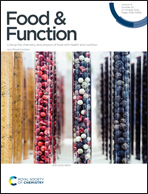Brassica rapa L. (Tibetan turnip) prevents sleep-deprivation induced cognitive deficits via the inhibition of neuroinflammation and mitochondrial depolarization†
Abstract
Brassica rapa L., an edible, feeding and medicinal plant cultivated on the Tibetan plateau with altitudes above 3800 m, has several pharmacological effects. However, its therapeutic effects against memory impairment and central fatigue have yet to be conclusively established. In this study, the Y-maze and Morris water maze tasks revealed that Brassica rapa L. aqueous extract (BE) significantly ameliorated cognitive deficits of sleep deprivation (SD)-treated mice. Moreover, BE treatment partially alleviated SD-induced reductions in the levels of peripheral energy metabolism, and significantly decreased inflammatory factor levels in serum and hippocampus. In addition, BE treatment significantly relieved central fatigue and stabilized the excitability as well as activities of neurons by regulating the levels of hypothalamus tryptophan metabolites and striatum neurotransmitters. The neuroprotective effects of BE were also confirmed using glutamate-treated HT22 cells, whereby BE pretreatment significantly attenuated intracellular ROS production and mitochondrial depolarization via adenosine 5′-monophosphate activated protein kinase/peroxisome proliferators-activated receptors (AMPK/PPAR-γ) signaling pathways. Thus, BE might probably prevent SD-induced learning and memory deficits by inhibiting neuroinflammation and restoring mitochondrial energy metabolism in the hippocampus. These findings imply that BE is a potential complementary therapy for those suffering from deficient sleep or neurometabolic disorders, although this needs verification by prospective clinical studies.



 Please wait while we load your content...
Please wait while we load your content...